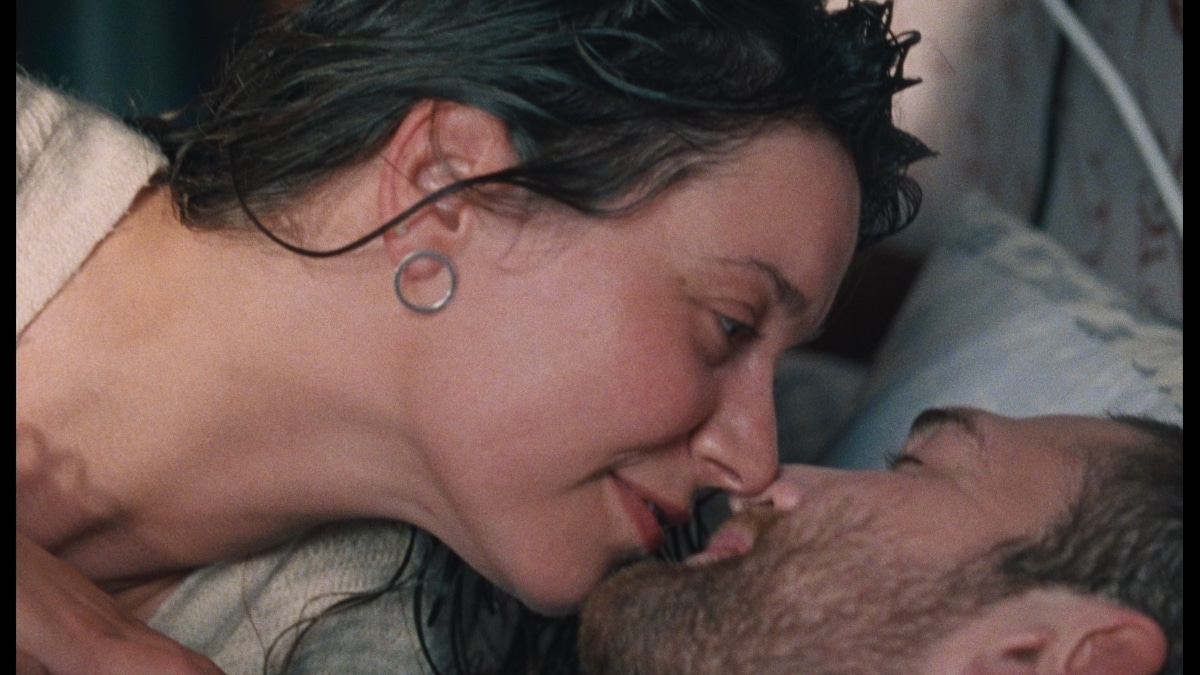
Can love be enough? Does love transcend desire? These are weighty questions explored within Kavtaradze’s romance drama Slow and it leaves a lot on the table for Sundance Film Festival audiences to ponder.
A disability can come in many forms. There are surface-level disabilities such as blindness, the need for a wheelchair, loss of hearing, etc. Then there are those unseen infirmities that many do not take as seriously as they should. Anxiety, depression, and other forms of mental health can also cause limitations in life. Slow, which made its way to Sundance last night, is about an unseen disability many may be unaware of.
Asexuality might not be a disability in the traditional sense. It does not hinder someone’s livelihood or require a need for long-term medical equipment. However, Slow depicts how much Asexuality disrupts relationships causing couples to find ways to adapt.
The need for intimacy or lack thereof is the focal point of Slow. Director Marija Kavtaradze has crafted an honest portrayal of finding romance when barriers are placed in relationships. It’s a fascinating love story from the viewpoint of a couple trying to make the best of a hard situation.
The film stars Greta Grinevičiūtė as Elena, a talented dancer who inherits a class of deaf students. When we first meet Elena, she is having the world’s most awkward one-night stand. What makes the evening awkward? The man cannot get aroused unless he hears that he is loved. It’s a scene that provides a nice setup to Elena’s current love life and plays well thematically to her later romance.
The group of students is gifted with a sign language instructor named Dovydas (Kęstutis Cicėnas). Dovydas is a charming man to whom Elena is drawn almost immediately. Elena explains to a friend she feels she has known Dovydas forever. Thus, the honeymoon phase of their love story begins.
Is love enough?
As Elena attempts to get intimate with Dovydas, he shuts off almost immediately, dropping a relationship bombshell. He explains to Elena that he is Asexual, meaning he lacks any need for intimacy and experiences no desirable urges. This is not a lifestyle Dovydas has chosen, what we learn is he is void of any feelings of achieving sexual urges.
From here, writer and director Marija Kavtaradze aptly demonstrates the compromises many make when facing limitations in a relationship. Slow takes us from one scene to the next, giving the audience a real feel for the push and pull between Elena and Dovydas. Elana needs something Dovydas cannot give her. And yet, Dovydas loves her unconditionally, and she is insanely in love with him. But is love enough?
Anyone who has been in a romantic relationship with someone who has limitations (this reviewer has a disability of his own) can relate to the movie. Vulnerabilities are exposed, bargains are made throughout, and sometimes hard questions are asked internally and externally.
This brings us back to the opening of the movie. In the opening scene, Elana is with a stranger who wants to be lied to about being loved but desires Elena physically. Juxtaposed to her lying in bed with Dovydas, who loves her with immense intensity, but feels no desire for her physically.
The performances by Greta Grinevičiūtė and Kęstutis Cicėnas are genuine and moving. There are scenes where Grinevičiūtė’s eyes literally speak without words. And Cicėnas’s role of Dovydas has a perfect balance of radiating charm while being frustrated by his lack of desire.
Slow is filmed with a fascinating dirty aesthetic. It has a grainy and worn-down look, almost as if this movie were shot on film in the 90s. Honestly, this reviewer loved the photography because it created a classical texture to the romance within and makes the story feel old-fashioned in a manner that does not exist in Hollywood anymore.
The ending will frustrate audiences. Kavtaradze made some choices that will leave some divided. However, reading over some interviews, it is clear she understands the ending has this impact and intended such an ending.
Whether it was intentional or not, the film’s finale does leave much to be desired. In times like these, this reviewer was hoping for a more hopeful conclusion. Especially in terms of a subject involving love with limitations. By the end, it leaves one feeling cold about what has transpired. Maybe this is the only ending that made sense to Kavtaradze, and maybe it will work for others.
A frustrating and fascinating glimpse at romance with limitations
Despite a frustrating ending, Slow is thought-provoking, charming, and a fascinating glance at romance with limitations. The Lithuanian romantic drama dares one to ask about decisions they would make if uncontrollable boundaries were placed in a relationship.
The best writers and directors flex with an empathetic heart, putting the viewer in the mindset of a person’s circumstance they would never otherwise experience. And Slow is written with a lot of empathy for its subject of Asexuality.
For more Sundance Film Festival coverage, check out our review of Kim’s Video and also read our list of anticipated films at the festival.